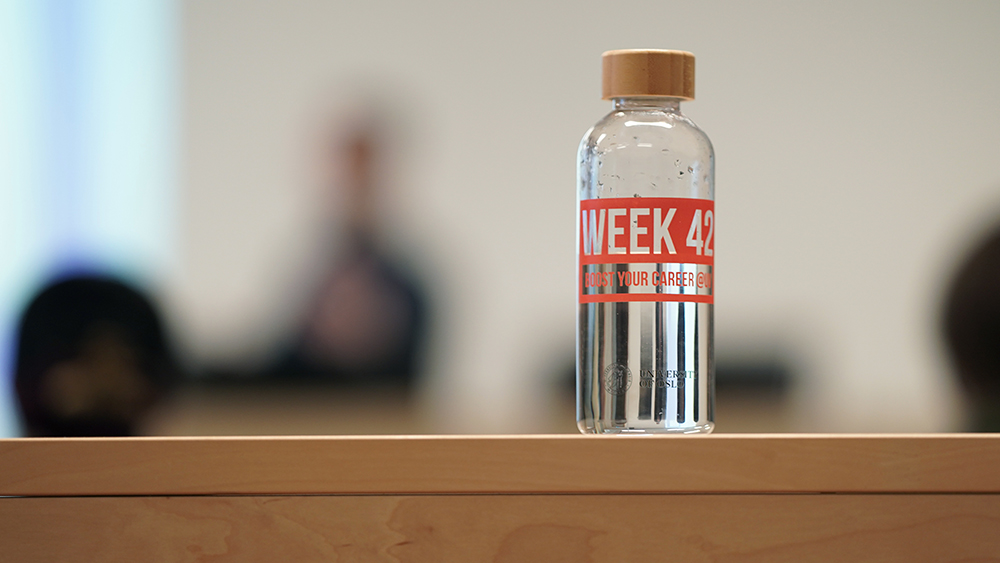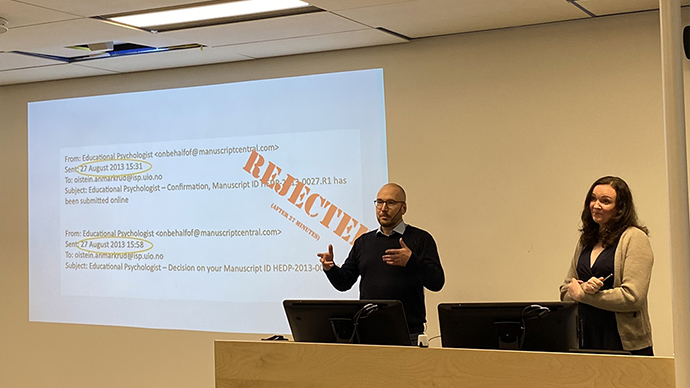This year’s career building festival, Week 42, drew 280 unique attendants to the 15 events organized by the Research and Communication Section here at the faculty – nearly twice as many attendants as last year.
People attending represented seven of the eight faculties at the University of Oslo.
"A wonderful week"
“Beyond all expectations!" said Elina Vinberg, project manager of the event. "We have tried to take on board the feedback we received from last year, and it seems that it had a positive effect on the attendance. It's really exciting to see that the most popular events are the ones held by UV's own employees.”
According to feedback, this year's participants seem to agree. One of them says:
“This was a wonderful week to be a part of! Thank you so much for arranging Week 42 like you do. With so many relevant and interesting talks. I wish I could´ve attended more sessions during this week. And I wish we had more arenas for 'research boost' throughout the year. Well done, and I look forward to next year´s Week 42 as well! :)”
Here are some tidbits:
"Excellent research proposals pass the dinner party test"
– Research proposal work is unpredictable, Tobias Bach, a political scientist at the Faculty of Social Sciences, reiterated in his talk on how to write excellent research proposals.

Bach urged his listeners to keep in mind that impact and evaluation sections are necessary, but not sufficient to get funding.
Main success factors, according to Bach, is perseverance, explicitness and ‘guesstimation’; an account of what you realistically might be able to find out in your project.
Norwegian record in time from submitting to rejection?
Øistein Anmarkrud and Marte Blikstad-Balas shared their best advice on what to do to get your academic work published in the very popular “How to get stuff published” seminar.
Anmarkrud were once rejected only 27 minutes after submitting the manuscript, a Norwegian record according to himself.

They shared practical tips, much appreciated by the audience saying that this is something every PhD and postdoc should have been exposed to at least once during their academic journey.
Don’t be a mere follower: engage on social media!
Glen Peters from CICERO Center for International Climate Research shared his thoughts on researchers' future on X/Twitter, as the platform is becoming more polarised and algorithm-driven by the day. The renown climate scientist said he never blocked anyone pre-Musk. Now he does.
Yet, he tweets to his 50 000 followers daily. How can young researchers 'succeed' on social media? Peters' winning formula, relevant for any platform, goes like this: Create your content with clear opinions, be regular, have a loose strategy, engage in discussions (with care), generate content or commentary and share stuff.
Build your online profile
Spend some time on your academic interests paragraph, was one of the messages from the trio behind the course and hands-on workshop “Build your online profile”.
Remember: Whenever you hand in an application for funding or a new job, people will google you.
Sunniva Raknes, Trine Smestad and Ivana Malovic talked about LinkedIn, the UiO personal profile page, and the researcher registry ORCID (Open Researcher and Contributor ID) – different platforms where you may share your research to become more visible.
Captured by fictionalized facts
In a 2022 communications project, Joke Dewilde and Monica Bjermeland wanted to show that students in a multilingual classroom are far more than their loss and trauma in a new way. Their hope was that a fictional dramatization in the form of a short story, would better help convey this idea than a traditional popularized article.
Dewilde said:
– A primary school teacher wrote to me after having read a draft saying that she was captured by the plot and could really envision the classroom we crafted. Making characters come alive is much more difficult – if not impossible – to achieve in a scientific article.
Pro PPT tips from two pros
Last year, one of the most popular events was Shane Colvin's presentation on presentation techniques in PowerPoint. This year, he got company from Clay Gouin and together they extended the presentation with at workshop with some hands-on tips after the presentation.
Be assured; this is definitely a keeper for next year; one of the participants stated that “It is one of the most educational seminars I have attended”.
Jo Røislien gave the final talk on science communication and how to get your message across, tying together several of the week’s topics and hopefully inspiring the participants to communicate in new and effective ways.
See you next year!
We’ll leave you with yet another piece of feedback from one of this year’s participants:
“Very useful and directly relevant to our common issues. Personally, I learned a lot this week! Please do more of these events and do them more often!”
We'll think about it, but for now: Mark your calendar, and sign up for our events next year.
